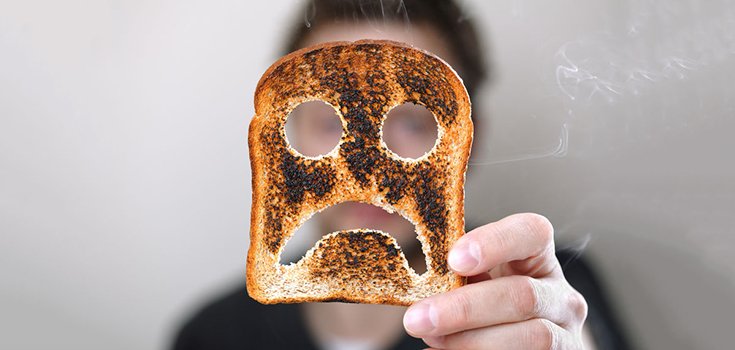What You Should Know About the Carcinogenic Nature of Overcooked Foods

If you’re going to eat toast and potatoes, cook them until they’re a golden color, not brown, the UK’s Food Standards Agency is warning. Why? Because overcooking them may increase your cancer risk.
The FSA issued the warning January 23 and launched a campaign aimed at educating the public about the carcinogenic dangers of overcooking starchy foods for too long. The campaign is based on longstanding evidence from animal studies in 2002, though that link has not yet been proven in humans. Still, it is believed that the same is true for humans. [1]
Donald Mottram, emeritus professor of food chemistry at the University of Reading in the UK, explained:
“No one will willingly eat acrylamide … (but) because it’s carcinogenic in animals, it would be carcinogenic in humans.”
Overcooking certain foods releases acrylamide, “a natural chemical which is formed when you heat certain food, such as starchy foods like potatoes and root vegetables,” explained professor Guy Poppy, chief scientific adviser to the FSA. [2]
He went on:
“When they’re cooked to above 120 degrees they naturally form acrylamide.”
The darker a food is cooked, the more acrylamide is released.
High levels of the chemical can also be found in some potato chips, cakes, cookies, cereals, and coffee.
Studies in rats have linked acrylamide exposure to cancer, according to the National Cancer Institute. The National Toxicology Program and the World Health Organization’s International Agency for Research on Cancer (IARC) considered acrylamide to be a “probable human carcinogen.”
Diane Benford, head of risk assessment at the FSA, said:
“The levels of acrylamide that are present in our diet are higher than we would be comfortable with. We would prefer them to be lower … that’s why the Food Standards Agencyis encouraging industry to try to reduce acrylamide levels in processed foods. And we wish to raise awareness among consumers of the things they could do to help reduce their exposure to acrylamide in food.”

Read: Steps for Avoiding Acrylamide in Cooked Foods
The advice given in the campaign is to:
- Look for the gold – Aim for a golden color or lighter when frying, baking, toasting, or roasting starchy foods like potatoes, root vegetables, or bread.
- Read the instructions – Always follow the cooking instructions carefully, whether you’re frying or oven-heating starchy foods.
- Keep raw veggies out of the fridge if you plan to roast or fry them – Potatoes that are refrigerated before cooking can have higher acrylamide levels than potatoes stored at room-temperature. Keep raw potatoes in a dark, cool place at temperatures above 42 F.
- Eat a balanced diet – It’s nearly impossible to avoid all sources of acrylamide, but eating a healthy, balanced diet rich in fruit and vegetables daily will help reduce your cancer risk.
Sources:
[1] CNN
[2] WebMD
